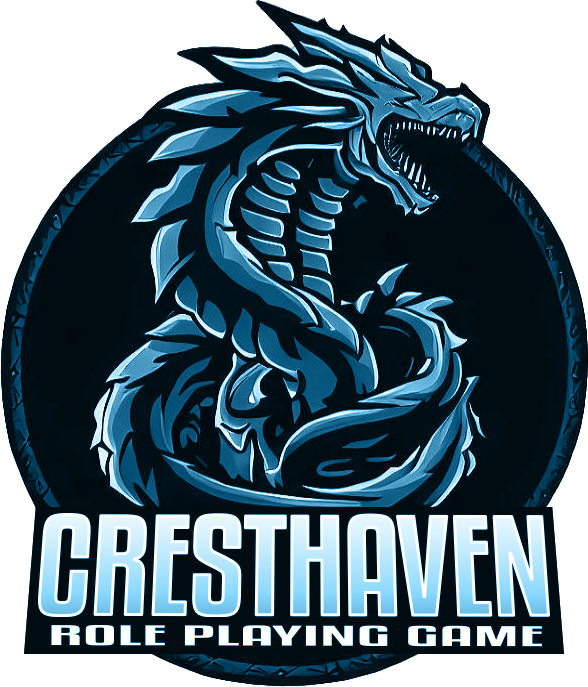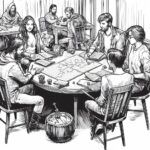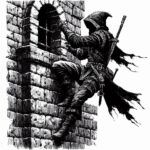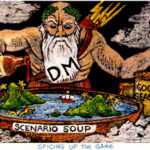As the Dungeon Master, checks are your primary tool for resolving uncertain, non-combat actions. They introduce randomness and challenge, making the game dynamic and engaging. This guide focuses on your role in setting up, running, and interpreting checks.
What is a Check?
A check is how you determine the outcome of an action when success is not guaranteed. Players roll a d20, add relevant modifiers, and compare the total to a Difficulty Class (DC). If their result equals or exceeds the DC, the action succeeds.
When to Call for a Check
In Cresthaven RPG, the process for using checks is very specific and player-driven, but ultimately controlled by your decisions as the DM.
How do you figure out what happens?
- The players tell you what they are trying to do. Players will declare their character’s intended action and what they hope to achieve.
- Your Role: Encourage players to state their goal clearly. Remind them they should never ask “can I do X?” but rather “I am trying to do X.”
- The players narrate how this is to be accomplished. This is where the players describe their character’s approach, leveraging their abilities, skills, and creativity.
- Your Role: Listen carefully to their descriptions. A player’s narrative can directly inform which ability score or skill is most appropriate. A player attempting to “climb” might use Dexterity for agility, or Strength for brute force, depending on their description.
- You decide if the action is actually possible, if a check is necessary, and what ability score to use. This is your critical decision-making point. Based on the “what” and “how” the players describe, use your common sense:
- Is this possible at all? Some actions might be impossible (e.g., jumping to the moon). In such cases, simply state it cannot be done.
- Do we need to roll dice? Only call for a check when the outcome is uncertain, the risk is real, and failure would change the situation in a meaningful way. Otherwise, narrate the outcome and move on.
- What ability score (and potentially skill bonus) would apply for that scenario? Choose the ability score that best reflects the character’s primary approach (Strength for raw power, Dexterity for agility, Intelligence for knowledge, Wisdom for perception/intuition, Charisma for social interaction, Constitution for endurance). If the character has training in a relevant skill, that skill’s bonus will apply.
Standard Check Formula:
d20 + Ability Modifier + Skill Bonus (if applicable) + Ability Focus + Situational Modifiers ≥ DC
If the total equals or exceeds the DC, the action succeeds.
Call for a Check When:
- The outcome is uncertain.
- Failure adds drama or consequence.
- Success is not guaranteed.
- Player narration presents a risk or challenge.
Design Philosophy: Cresthaven Is Not a Puzzle Box
Use checks to guide story momentum, not to gatekeep it. Failure should add problems, not stop the game. Play to reveal, not restrict.
Understanding Checks: The Core Mechanics
- Ability Modifier: Based on Strength, Dexterity, Intelligence, Wisdom, Constitution, Charisma.
- Skill Bonuses: Apply if the character has training in a skill. Characters without training in a specific skill can still attempt an action, but they only add their base ability modifier to the roll, unless otherwise noted. If the character is trained in a relevant skill, add the skill bonus on top of the ability modifier. (See Player’s Guide for full list of skills.)
Special Dice Mechanics
Rolling Advantage / Disadvantage
You will often grant advantage or impose disadvantage based on circumstances, spells, or character abilities.
- Advantage: Player rolls two d20s, takes the higher.
- Disadvantage: Player rolls two d20s, takes the lower.
Remember that if a situation grants both advantage and disadvantage, they cancel each other out, and the player rolls normally.
Natural 20 Rule
DMs may treat natural 20s as automatic successes for most checks, especially when it adds drama or fun. In opposed rolls or ability saves, a natural 20 does not always guarantee success, but should still result in a strong or exceptional result.
Ability Focus
Characters with Ability Focus add an extra bonus equal to their level divided by 2 (rounded up) to checks using that ability. Remember to account for this if a player has it.
Team Checks
For tasks requiring the team’s collective effort, you have two primary ways to handle them:
- Standard Team Check: When the whole group contributes to a task that benefits from a unified effort, use the highest relevant ability modifier amongst the players and then roll with advantage (2d20 taking the highest result).
- Individual Rolls (for specific risks): You may use individual rolls instead if the task involves stealth or other risks where one failure could affect the whole group. This creates tension and highlights individual performance within the team.
Player’s Deal with the DM
Once per game session, at your discretion, a player may propose a “Deal with the DM.” If you accept the deal, the player can change one of their d20 rolls (skill check, ability save, or attack roll) to a natural 20. In exchange, you, as the DM, gain the power to change any other player’s d20 roll to a natural 1 at a later point in the same game session. This tool should be used sparingly and for maximum dramatic effect.
Heroic Points as the DM
As the DM, you also receive the same number of Heroic Points as the players each session. You can use these points in the exact same ways to impact your rolls (e.g., for NPC checks, opposed rolls, or other moments where you roll dice). You can spend these points for:
- Re-rolling a dice roll: You re-roll any d20 and must keep the new result.
- Add advantage: You gain advantage on any d20 roll.
Difficulty Class Guidelines
Standard DC Chart
| Challenge Level | DC | Best Used When… |
|---|---|---|
| Very Easy | 0–5 | Obvious or trivial tasks |
| Average | 10 | Routine task, mild chance of failure |
| Tough | 15 | Requires skill or clever use of gear |
| Challenging | 20 | Demands training, time, or good rolls |
| Heroic | 25 | Epic feats, elite opposition |
| Nearly Impossible | 30+ | Miracles or extreme circumstances |
- Emphasis: Don’t use DCs above 30 without strong narrative justification.
Setting Appropriate DCs
- Consider the character’s expected skill level: A DC of 15 might be “Tough” for a general character, but “Average” for a highly trained specialist.
- Factor in environmental conditions: A climb in heavy rain should have a higher DC than on a clear day. Dim light might impose disadvantage on a search check.
- Adjust for creative approaches: If a player comes up with a clever solution, you might lower the DC or grant advantage. Reward good role-playing!
- Remember that failure should advance the story, not stop it. A failed check should create new complications or reveal interesting consequences, not halt the game entirely.
Rewarding High Rolls (Exceeding the DC)
When a character beats the DC by 5 or more, consider providing additional benefits beyond simple success. This rewards strong rolls and player investment:
- Extra information or clues (e.g., finding not just the secret door, but also why it’s there).
- Faster completion (e.g., picking the lock quickly, avoiding a patrol).
- Avoiding complications (e.g., disarming the trap without a sound).
- Discovering bonus resources (e.g., finding a hidden stash while searching).
Common Skill Checks (for DM Reference)
Keep these in mind when players describe their actions:
- Climbing: Dexterity (Climb) Check.
- Hiding: Dexterity (Stealth) Check. When a player attempts to hide, you roll their Dexterity (Stealth) check behind your screen. This “hidden number” is then compared to an NPC’s or monster’s Notice score or active Wisdom (Search) Check to see if the player is detected. The player should not know the exact result of their roll; their character might believe they are hidden, but a foot could be poking out.
- Searching: Wisdom (Search) Check.
- Listening: Wisdom (Listen) Check.
Passive Checks (DM Initiated)
A passive check is not rolled. Instead, use the character’s calculated score to determine whether they notice something automatically. You calculate passive checks secretly, unless there’s a strong reason for the player to know the exact passive result.
Notice Passive Ability
Notice is a passive ability that is always on. The DM uses a character’s Notice number to determine if they passively spot things like secret doors, ambushes, or hidden objects.
- Notice Formula:
Wisdom + Ability Focus (if focused in Wisdom) + 10 - Elves might automatically notice secret doors (calculated using their Notice score).
- Characters with high Wisdom might passively notice danger or hidden details using their Notice score.
Situational Checks (DM Reference)
- Standard Searching: A default Wisdom (Search) Check with a DC of 17 or greater is used for finding hidden doors, traps, or secret compartments. Thieves and Elves receive specific bonuses to this check.
- Standard Listening: A Wisdom (Listen) Check with a DC of 17 or greater is used. This typically requires all characters to stop and be quiet. Armor can create disadvantage due to noise. Environmental factors (like waterfalls or strong wind) increase the DC. Undead make no noise and cannot be heard this way.
Ability Saves (DM’s Role)
You will call for ability saves when characters need to resist harmful effects.
How to Call for an Ability Save
When an effect (like a spell or poison) targets a character, you state the ability score needed for the save and the DC.
Common Ability Save Types
- Poison (ingested/injected): Constitution Save
- Magic (mental or magical): Intelligence Save (for resisting mental magic or illusions) or Wisdom Save (as appropriate)
- Breath weapons or gas: Wisdom Save
- Petrification/Paralysis: Strength Save
- Death Check at 0 HP: Constitution Save
Spell Save DCs (for Spellcasters)
When an NPC spellcaster targets a player with a spell requiring an ability save, calculate the DC as:
Spell Save DC = 10 (base) + Spell Level + Caster's Ability Modifier (e.g., Intelligence for Wizards, Wisdom for Priests) + Ability Focus or other bonuses
Mastering Checks: Advanced Techniques
Handling Critical Story Moments
When a check is essential for the story to progress, and a failure might halt the narrative, consider these DM techniques:
- Automatic Success with Complication: Let them succeed, but add a twist or a new problem.
- Example: They find the hidden door but trigger a loud alarm.
- Example: They unlock the chest, but the contents are cursed.
- Remove the Check: If success is absolutely necessary for the story to continue, simply narrate the success and move forward. Save checks for uncertain, meaningful outcomes.
Opposed Checks
Use an Opposed Check when two characters are actively competing (e.g., grappling, lying to one another, sneaking past a guard). Use a set DC when the challenge is static (e.g., picking a lock or climbing a wall).
When two characters (or a character and an NPC/creature) compete directly, call for an Opposed Check:
- Both combatants roll their relevant checks.
- The highest total wins.
- In case of a tie, the defender usually wins, or you can call for a re-roll.
Creative Use of Equipment (Equipment Bonus)
Encourage players to describe using their equipment creatively. If a player has a piece of equipment that would logically assist in the situation, and they describe using it plausibly, you may grant a bonus of +1 to +3 to their check, at your discretion.
Ability Flexibility (Same Action, Different Ability Example)
| Action | Possible Ability Used | Description |
|---|---|---|
| Climb a wall | Dexterity (Climb) Check | Careful movement, finding handholds |
| Strength Check (no skill bonus) | Raw power, muscling through obstacles | |
| Intimidate | Charisma (Deception) Check | Force of will, imposing presence |
| Strength Check (no skill bonus) | Physical threat, intimidating with size/weapon | |
| Find a clue | Wisdom (Search) Check | Perception, noticing hidden details |
| Intelligence Check (no skill bonus) | Deduction, analyzing evidence for meaning |
Tips for DMs
Rolling Behind the Screen
For certain checks, especially those related to stealth, passive awareness, or hidden information, it’s beneficial to roll the dice behind your DM screen. This prevents players from knowing the exact result and allows you to:
- Hiding: When a player attempts to hide, you roll their Dexterity (Stealth) Check behind your screen. This “hidden number” is then compared to an NPC’s or monster’s Notice score or active Wisdom (Search) Check to see if the player is detected. The player should not know the exact result of their roll; their character might believe they are hidden, but a foot could be poking out.
- Maintain Suspense: If a player fails a Notice check to spot a hidden monster, they don’t know they failed, preserving the surprise.
- Avoid Meta-gaming: Players can’t react differently just because they saw a low roll.
Fudging Rolls
As the DM, your goal is to create tension and engagement. In rare moments, you may ignore or adjust rolls to enhance pacing or drama. Fudging should never override player agency, but it can be used sparingly to preserve the momentum or stakes of a scene.
Fudging is a tool for storytelling, not cheating. It should be used to enhance the game, not to undermine player choices or create unfair outcomes.
Setting DCs
- Start with the standard chart as a baseline.
- Adjust for specific circumstances (equipment, environment, player approach).
- Consider the consequences of both success and failure before setting the DC.
- Don’t be afraid to adjust a DC mid-session if it feels wrong or unfair.
Encouraging Roleplay
- Always ask players to describe their approach before they roll.
- Reward creative and descriptive solutions with advantage or lower DCs.
- Use partial successes to keep the story moving, even on a failed roll.
- Remember that interesting failures are often better for the narrative than boring successes.
Maintaining Flow
- Do Not Roll If…
- The action is trivial or routine.
- Failure adds nothing interesting to the story.
- Success is guaranteed by the situation or character abilities.
- The player has already earned success narratively through prior actions or role-playing.
- Group similar checks together when possible to save time.
- Use passive checks to quickly resolve routine background activities.
- Always have consequences ready for both success and failure to keep the narrative flowing.
Failure Results (Consequences Cheat-Sheet)
| Failure Result | Description | Example Consequence |
|---|---|---|
| Complication | A new problem or obstacle emerges. | Noise alerts an enemy patrol. |
| Delay | The task takes significantly more time than expected. | Risky interruption by an event or threat. |
| Resource Loss | A tool breaks, stamina is lost, or a spell is wasted. | Lockpicks snap, character is Exhausted. |
| Incomplete | Success is partial, or only some clues are found. | Only half the information gathered. |
| Backlash | The action results in immediate negative feedback. | A trap triggers on the character. |
Final Thoughts
As a DM, your role is not to enforce the rules but to guide the story. Use checks as a way to spotlight character choices, escalate tension, and reward creative thinking. Let the dice surprise you, but never let them control you. Keep things moving. Keep things fun.
This Post Has 6 Comments
Leave a Reply
You must be logged in to post a comment.








There’s something I don’t totally understand about difficulty checks. From what I’m getting from the explanation, difficulty checks are easier to pass if the number is low. But from the examples shown so far, such as
“Example: a Learned Spellcaster with a +2 Intelligence casts a Fireball. Since it is a 3rd level spell and the Learned Spellcaster has a +2 Intelligence, the difficulty check (DC) would be: 15 …. or 10 (base) + 3 (level of spell) + 2 (spellcaster skill)”
it seems to be that the player’s skill is actually making the difficulty check harder. In the example, wouldn’t it make more sense for the +2 intelligence to make the difficulty check easier by being subtracted in the formula? Again, I could totally be missing something.
You don’t add the skill bonus to the difficulty. You add it to the roll. A fire ball difficulty is 13. The player rolls d20+ their intelligence and focus.
This DC is not for the caster to cast the spell, it’s for a save from a target against the spell. In this example, the fireball is always fired (and the spell slot used). But the creatures taking the hit can make a save roll to try to dodge it and only take half damage. For that they’d have to roll a dexterity save greater or equal than 15 (the caster’s DC).
It works in reverse from a classic attack, where the attacker have to make a roll against the target’s AC (armure class). Magic, you have to defend against it – if you want to.
PS: In D&D 5e, the formula is now :
« 8 + caster’s requisite bonus (Int/Wis/…) + caster’s proficiency bonus (fixed by the caster’s level) »
Making it way more simple to use, as it doesn’t change depending on the spell cast. You just calculate it one time when you level up, like the AC.
Yes there is a save if listed, but casters must make a cast check to see if their spell is successful. It’s 10+ the level of the spell. See spell casting for more details
Above you mention determining a Difficulty Check and as an example give: “This might be attacking (d20 + Strength + Hit Bonus)”.
On the Basic Terminology page you say that Hit Bonus = Strength Bonus (or Dexterity for range) + Ability Focus (if applicable).
So should the Difficulty Check for hitting actually just be (d20 + Hit Bonus) since HB includes Strength and other attributes?
Just trying to get the rules down to play some simple games with my son.
Good catch. Updated